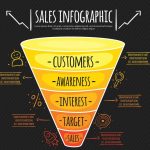In the fast-paced and always-changing world of e-commerce, how you deal with leads may make or destroy your business. If you want to make more money, you need to know how to handle leads, no matter how long you’ve been in business. A lot of e-commerce businesses have a lot of potential consumers, but if they don’t know how to handle these leads, they could miss out on sales. When you get leads, you need more than just names and email addresses. You should also think of ways to help people who are considering about buying anything. You might get more leads that turn into clients, make greater connections with them, and develop your business by improving this process. This post will talk in depth about the best tools, strategies, and methods for handling leads in e-commerce. This will help you get leads, take care of them, and turn them into paying customers faster.
What does “lead management” mean when you buy anything online?
Lead management in e-commerce is the planned technique to get individuals who are interested in your goods to buy it. It’s basically the most important part of your sales process. The process starts when someone who could be interested in your goods or services does anything like visit your website, sign up for your newsletter, or leave a remark on one of your social media posts. You need to qualify a lead to find out how likely they are to buy after you acquire one. You may accomplish this by looking at things like their age, gender, or how often they work out.
The next step is the nurturing stage, where you talk to the lead a lot and in a way that is unique to them. This helps you get to know them better over time. The last phase is conversion, which is when the lead becomes a paying customer. Good lead management makes sure that no lead is left out, that all leads are sorted by how likely they are to buy, and that each lead gets the right amount of attention as they move through the sales funnel. In the cutthroat world of e-commerce, it’s very important to have a robust lead management system in place so that your business doesn’t lose sales.
Why Lead Management Is Important for E-commerce
You can’t just get leads; you also need to plan how to handle them at every stage of the client journey. A robust lead management plan is important for the success of your online store for the following reasons:
People are spending more money.
Getting more people who are interested to become paying customers is one of the main goals of lead management. If you handle leads correctly, you may give the appropriate people the right information at the right time. If you talk to a lead in a personal way about their requirements and problems, they are more inclined to buy. If you classify and break out your leads based on where they are in the buying process, you can write messages that engage with them on a deeper level. This will assist you make a deal.
More productive sales
A effective lead management system helps your salespeople focus on the leads that matter most. Lead management solutions help you focus on the best leads, or those who have made it evident that they want to buy. This way, you don’t have to waste time chasing after every lead. Not only does focusing on the best leads boost sales productivity, but it also helps your sales team be more effective by letting them put their time and attention where it matters most.
What the information says
With proper lead management, you can learn what your customers buy, like, and do. These insights assist organizations figure out which leads are the best, which kind of customers are most interested in their brand, and which products or services are the most popular. You can make marketing plans just for a certain group of clients if you notice that they buy more often. You can also improve your strategy and get better results by keeping track of how often leads read your emails and how long they spend on product pages.
Better connections with customers
You also need to take care of leads if you want to keep consumers for a long time. When you talk to leads in a way that is unique to them, you are not only trying to sell them something, but you are also creating trust. This plan makes it more probable that the lead will choose your company when they are ready to buy since they feel like they know you, understand you, and value you. Lead management systems let businesses stay in touch with customers at all levels. Customers are more inclined to buy from them again and stay loyal if they trust them more.
The Best Ways to Follow Up with Leads in E-Commerce
It can be hard to keep track of leads by hand, especially as your organization grows. Managing leads could be faster and easier if you have the correct tools. This saves time and makes sure that you don’t miss any leads. These are some of the best lead management solutions that can help you run your online store in a new way:
1. HubSpot’s software for managing customer relationships
HubSpot CRM is straightforward to use, so a lot of online businesses utilize it to keep track of their leads. It’s a great program that lets you get leads from many places, like your website and social media. HubSpot is wonderful because it can keep track of how leads interact with your business in a lot of different ways. This gives you a lot of information about how leads are interacting with your brand. The platform also has great automation tools that let you send follow-up emails based on what a lead does, such as reading an email or going to a product page.
You can also put leads into more than one group with HubSpot’s segmentation tools. This allows you send a different message to each possible customer. The software also gives you a lot of information that illustrate how well your lead management tactics are functioning. This helps you figure out what works and what doesn’t.
2. Salesforce’s Sales Cloud
Salesforce is a full CRM solution that helps online stores keep track of leads, sales, and how they talk to customers. Salesforce Sales Cloud can automatically acquire leads from emails, web forms, and social media. This is a feature that works well. You may rate leads depending on how likely they are to buy, which helps your sales staff focus on the leads that are most likely to buy.
Salesforce also has a lot of reporting tools that can help you see how well you’re following up with your leads. This makes it easy to keep track of how well your campaigns are going. Salesforce works well with a lot of other products, like email marketing platforms and payment systems. This implies that you can keep all of your customer and sales information in one location.
3. Pipedrive
Pipedrive is a sales CRM that works well for small and medium-sized firms who sell items on the internet. It is a simple sales pipeline that shows you where leads are at each step of the sales process. One of the best things about Pipedrive is that you can customize the forms on your website that people fill out to get leads. This makes it simple to find and organize information regarding leads.
Pipedrive also has lead nurturing routines that automatically send follow-up emails and task reminders so you never miss a lead. You may focus on the leads that matter most by using the platform’s lead scoring and filtering features. This will help you get more customers and make your salespeople work harder.
4. Zoho CRM
Businesses that require a flexible way to keep track of their leads might use Zoho CRM, which is cheap and incredibly adaptable. It has a lot of ways to encourage people to talk to you through email, phone, social media, and live chat. It also has ways to gather leads, score them, and automate tasks.
You may utilize Zoho CRM’s AI-powered insights to help you find the best way to deal with your leads. This will help you get better at scoring leads and finding the right ones. You may also adjust the program’s exact data and statistics to examine how leads act and how well your sales are going overall.
5. ActiveCampaign
ActiveCampaign is a marketing automation application that comes with a CRM and extensive email marketing features. It’s a terrific tool for internet businesses who want to keep track of their leads and send out automated emails at the same time. It’s easy to link ActiveCampaign to your online store and use it to make forms and landing pages that will help you obtain leads.
One of its biggest features is that it can automatically nurture prospects through email sequences, SMS marketing, and the activities that customers take. The platform’s dynamic segmentation features make sure that leads get the most useful content depending on their interests, actions, and where they are in the sales funnel.
How to Deal with Leads in E-Commerce
Following best practices that make your lead management process better is the greatest approach to get the most out of the resources you have. These tactics can help you get more leads and make it more likely that you can turn them into repeat clients.
1. Get leads from a lot of various sources
You can’t just use one source of leads anymore in the digital age. You need to get leads from a variety of various locations to reach the most people. This includes your website (including forms, pop-ups, and landing pages), social media sites like Facebook, Instagram, Twitter, and LinkedIn, sponsored ads on Google and social media, and programs that provide consumers rewards for informing others about your business. Each channel brings in a different kind of lead. Using several methods to generate leads can help you reach as many individuals as possible.
2. Put leads in groups so you can access them more easily.
There are different kinds of leads. Some people are just beginning to think about buying, while others are virtually ready to do so. You can get the most out of your communications by grouping your leads by things like their age, gender, location, behavior (like what products they’ve shown interest in and how often they visit your site), and lead source (where they came from, like a paid ad or social media). You may give your leads more personal and relevant information when you put them into groups. This will make it more likely that they will change.
3. Let Lead Nurturing Happen on Its Own
Lead nurturing is a way to get to know your leads better over time. Automation is quite helpful here because it lets you talk to leads on a regular basis without having to do anything yourself. You can set up automated email sequences, SMS reminders, or push notifications based on how well the lead does. For instance, you could send someone an email straight away to remind them to finish their purchase if they leave their cart. You can be sure that no one will be left behind and that your sales process will go well if you automatically nurture leads.
4. Use lead scoring to sort leads by quality
Lead scoring looks at things like how often leads visit your website, read your emails, and their age and gender to assist you find out which leads are most likely to buy from you. By giving points to leads based on these factors, you can focus your sales efforts on the ones that are most likely to buy. Lead scoring helps you and your sales team save time by making sure they don’t waste time and energy on leads that aren’t worth much.
5. Get in touch promptly and keep doing it.
When it comes to managing leads, speed is really important. Research reveals that leads are more likely to become customers if you follow up with them right away. If you answer a lead’s inquiry within five minutes, you are far more likely to turn them into a buyer. Automated follow-ups can help you keep track of all your leads, but you should make each one different so that the lead stays engaged and connected.
6. Always look over and enhance the way you handle leads.
You should always think about how you deal with leads and make changes to make it better. To determine how well your method is working, keep a watch on important performance metrics like lead conversion rates, response times, and lead quality. You can learn a lot about what works and what doesn’t by looking at these indications often. Changing how you rate leads, how your automated workflows work, and how you provide alerts can all help you improve your operations.
Conclusion
One of the most important things for e-commerce enterprises to do is to handle leads well. Using the proper tools, following best practices, and always looking for ways to enhance your operations can help you make sure you’re effectively capturing, nurturing, and turning leads into loyal customers. You don’t simply deal with leads once; you do it all the time. If you do it right, it will greatly increase your sales, keep customers interested, and help your business expand.
A effective lead management system will help you sell more by letting you focus on the most important leads, get to know your customers better, and grow your business. Your online store will do well if you use the tools and follow the advice in this guide.














